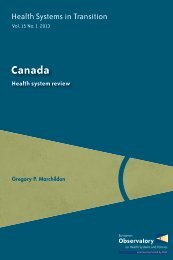Health Systems in Transition - Hungary - World Health Organization ...
Health Systems in Transition - Hungary - World Health Organization ...
Health Systems in Transition - Hungary - World Health Organization ...
Create successful ePaper yourself
Turn your PDF publications into a flip-book with our unique Google optimized e-Paper software.
<strong>Health</strong> systems <strong>in</strong> transition <strong>Hungary</strong> 99<br />
be considered official salary supplements. They do, however, provide some<br />
material <strong>in</strong>centive for doctors to stay <strong>in</strong> the profession, especially for certa<strong>in</strong><br />
specialties (e.g. gynaecology, surgery).<br />
The majority of personnel, <strong>in</strong>clud<strong>in</strong>g nurses and midwives, cont<strong>in</strong>ue to<br />
be salaried public employees. In 2010, health care workers’ salaries ranked<br />
strik<strong>in</strong>gly low among those of full-time employees of the 20 ma<strong>in</strong> sectors of<br />
Hungarian economy (see Table 3.9). This is closely l<strong>in</strong>ked with the human<br />
resource crisis <strong>in</strong> the health system, which endangers the susta<strong>in</strong>ability of<br />
current performance even for the near future: accord<strong>in</strong>g to the NISHR, the<br />
number of health care workers dropped <strong>in</strong> public <strong>in</strong>stitutions (see more <strong>in</strong> 4.2.1).<br />
Table 3.9<br />
Average monthly gross wages of employees <strong>in</strong> health care and <strong>in</strong> the national economy,<br />
HUF<br />
2006 2008 2010<br />
<strong>Health</strong> care 165 000 185 000 176 000<br />
– as % of average <strong>in</strong> national economy 96.2% 93.3% 87.0%<br />
Industry 163 000 188 000 207 000<br />
– as % of average <strong>in</strong> national economy 95.3% 94.7% 102.2%<br />
F<strong>in</strong>ancial services 402 000 432 000 433 000<br />
– as % of average <strong>in</strong> national economy 234.4% 217.2% 214.0%<br />
Public adm<strong>in</strong>istration and defence 223 000 268 000 243 000<br />
– as % of average <strong>in</strong> national economy 130.2% 134.7% 12.2%<br />
National economy <strong>in</strong> average 171 000 199 000 203 000<br />
– as % of average <strong>in</strong> national economy 100.0% 100.,0% 100.0%<br />
Source: HCSO, 2011.<br />
Notes: €1 = 265.43 HUF (August 2011), Central Bank of <strong>Hungary</strong>.<br />
Despite repeated mentions <strong>in</strong> policy papers by the M<strong>in</strong>istry of National<br />
Resources s<strong>in</strong>ce the beg<strong>in</strong>n<strong>in</strong>g of 2000s, that the low wages of the health workers<br />
should be a top priority of health policy agendas, no effective policy has been<br />
formulated on this matter and no modification of the strict cost-conta<strong>in</strong>ment<br />
strategy towards the health sector has taken place. The s<strong>in</strong>gle exception was the<br />
– on average – 50% raise <strong>in</strong> public sector salaries <strong>in</strong> the fall of 2002, just before<br />
the local government elections. This significant <strong>in</strong>crease brought the official<br />
salaries <strong>in</strong> the health sector closer to the <strong>in</strong>dustry average <strong>in</strong> follow<strong>in</strong>g years<br />
but health care wages have been levell<strong>in</strong>g off aga<strong>in</strong> s<strong>in</strong>ce 2005 (HCSO, 2010c).<br />
Obviously, there are differences <strong>in</strong> wages among health professionals.<br />
Medical doctors earn far higher wages than nurses or other health workers, but<br />
still have far lower monthly gross earn<strong>in</strong>gs than the f<strong>in</strong>ancial sector average,
















